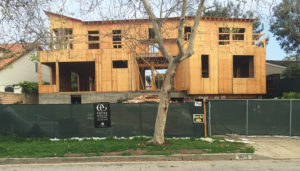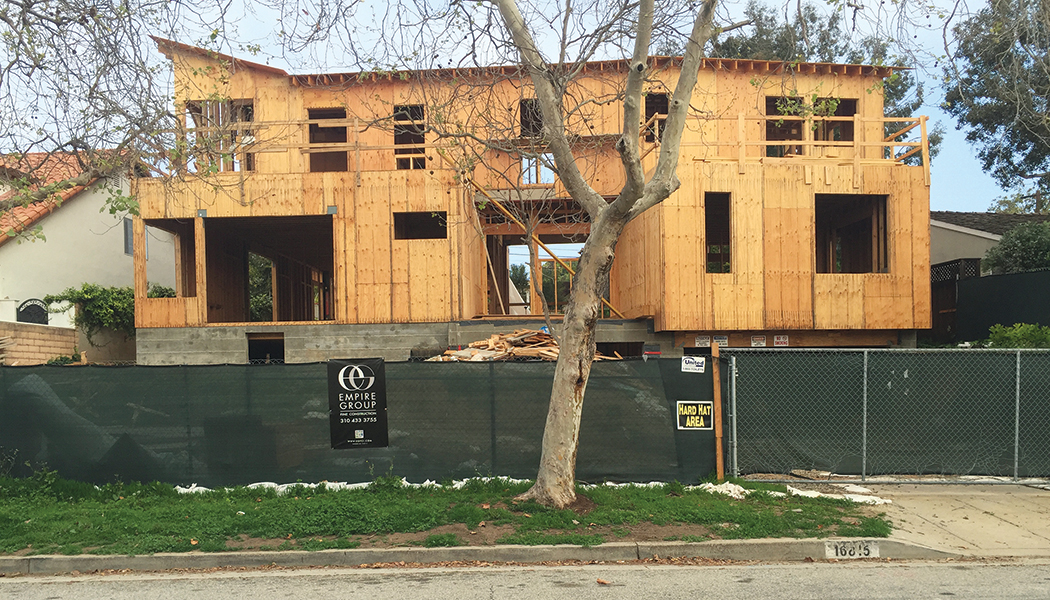By Sue Pascoe
Editor
The city halted construction on the 16815 Bollinger “remodel” on a 7,887-sq.-ft. lot in April. A sign posted on the property gave the reason as “construction done without permits or inspections.” The house, which was called a remodel, was almost entirely demolished, and framing was well underway when construction was halted.
Owner Christopher Rhoades of Helios DRE Joint Ventures, LLC, requested a hearing to appeal the decision, stating that the L.A. Department of Building and Safety erred or abused its discretion in issuing a Notice to stop work.
Rhoades, who purchased the home for $2.15 million in June 2015, was represented by attorney Kevin McDonnell of Jeffer Mangels Butler & Mitchell.

“All the plans show which walls are being removed and the demolition,” McDonnell told Theodore Irving, the Zoning Administrator who presided over the hearing on September 1.
“We had a permit,” said McDonnell, who argued that Building and Safety had the plans and had signed off on it.
McDonnell said that when the owner asked why construction had been shut down, Building and Safety told him there is a 50 percent rule about remodels. That, if more than 50 percent of the building is taken down, it is not a remodel. McDonnell said he looked at the laws and could not find this rule. “Where is it codified?” he asked, noting that no one in the city could answer him. Instead, he was told that “Building and Safety had told them that City Planning had made a mistake.” The contested home in Marquez is located in the Coastal Zone. All homes in that zone must go through the Coastal Commission, according to Irving, the Zoning Administrator. The question is whether the owners are given an exemption (which happens in the case of many remodels) or whether a full hearing is held—which also means notifying neighbors.
In this case, since it was called a remodel, the project was given the exemption and did not need a hearing.
The city “checked the Coastal Commission box for exemption,” McDonnell said.
He argued that a Los Angeles Times story (“L.A. Lawmakers Plan to Grandfather in Hundreds of Granny Flats,” August 31), was applicable in this case. Basically, the City Council voted to grandfather in second units that were already approved or in the pipeline, as long as owners had already submitted their plans to the city. New units would have to follow a revised law.
McDonnell concluded the project should not have been stopped because there was no law and the city had approved all of the permits and plans. “They [city] need to adopt a new plan, but they can’t do it retroactively.”
Neighbor Jennifer Dersh spoke against resuming construction. “It’s been represented as a remodel, but it was demolished,”she said. “It’s all new construction.”
“The city did the right thing by stopping construction. This was not a remodel no matter how you slice or dice it. The Coastal Commission exemption given was on the basis of a remodel.”
She dismissed McDonnell’s argument that the project was so far along that nothing could be done, stating “Framing is only 10 percent of a project.”
Claudia Olson-Michels lives next door to the project. “The entire home was taken down except one wall with studs,” she said. “This is brand-new construction, there is no way around it.”
She complained about the flapping of the plastic that was put over the wood when construction was stopped and the animals that had moved onto the property. “It’s a dump with raccoons,” she said. “I don’t like rule breaking. You say it’s a remodel to get things done faster and then you do what you want to do.
“But I want to see a solution,” Olson-Michels said.
Attorney Jack Allen spoke, representing neighbor John Wilson. “This is clearly not a remodel,” he said. “The owner should have had to get a Coastal Development Permit from the City.
“This will happen all over the Palisades until the city does something,” Allen continued. “They avoid having a hearing and a coastal review [by saying it’s a remodel].
“The city investigated and found it wasn’t a remodel,” he said. “One remedy would be to tear the house down and start all over.”
McDonnell was allowed to respond. “This was done consistent with the policy at the time. Permits were issued and the project was clearly more than a 50-percent remodel. Going forward, we should not be punished retroactively.”
A decision will be issued in eight to 10 weeks, but can be appealed to the West Area Planning Commission.
McDonnell was asked later why his client didn’t initially ask for a Coastal Commission hearing. He responded in a September 1 email:
“My client did not go through the Coastal Development Permit process because the City Planning Department provided the Coastal Development approval with the exemption—then it took it away, causing all the problems.”
He added that he felt the city and Coastal Commission could handle retroactive Coastal Development Permit Exemptions the same way proposed for “granny flats.”












You must be logged in to post a comment.